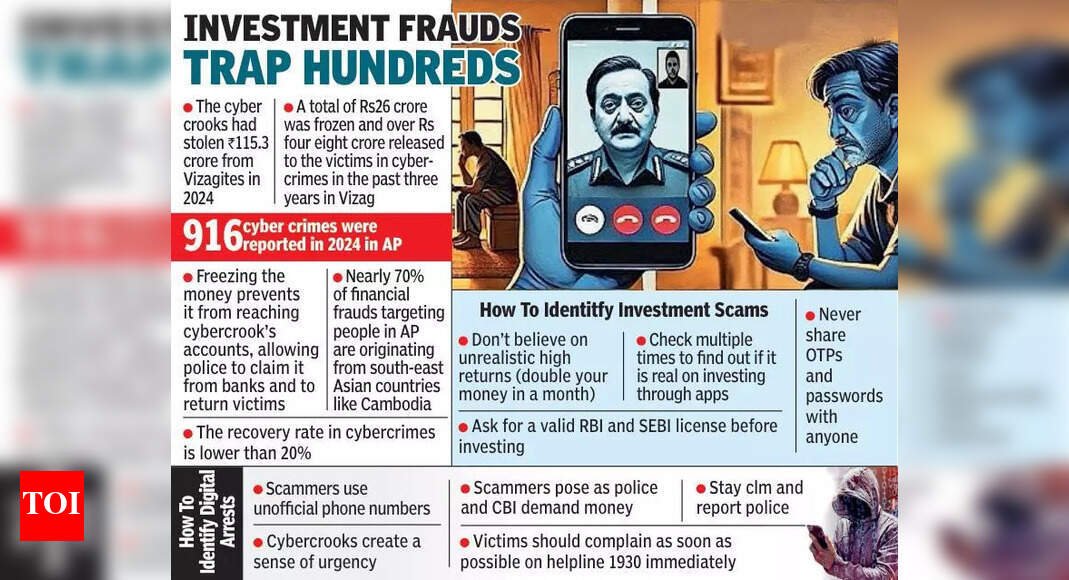[ad_1]
Visakhapatnam: Residents in parts of Andhra Pradesh are reportedly losing a minimum of Rs 30 to 50 crore each month due to cyber frauds emanating from Cambodia and other Southeast Asian countries. Investigations have indicated that three primary types of cybercrime frauds are prevalent_ stock trading and investment scams, digital arrest schemes, and task-based cons, all operating from Southeast Asia. Authorities note that the rate of recovery in such financial cyber fraud cases remains extremely low. These scams are frequently run from high security locations, reportedly controlled by Chinese operators, where trafficked people, including youngsters from Andhra Pradesh, are forced to work.In one incident, a 40-year-old private employee from Vizag city was duped of over Rs one crore after engaging with a mobile link that advertised extraordinary share trading returns ranging from 150 to 200 per cent. He was subsequently added to Telegram and WhatsApp groups, where administrators showcased charts and reports displaying significant profits, and allowed limited withdrawals to build the victim’s trust. Upon investing a total of Rs one crore, the victim found that all communication stopped abruptly, and the scammers disappeared.At least 1,500 to 2,000 victims of cybercrimes approach cybercrime police stations in Vizag and Vijayawada cities and a few other towns in a month. Sometimes the victims do not even file a complaint with the police, believing it to be an embarrassment. As per estimates, people, including high profile personnel and tech-savvy people in the state, are losing at least Rs 30 crore a month for the past six months.People become victims of financial scams largely as a result of insufficient research, excessive reliance on information from social media, failure to properly verify data with authoritative sources, and a strong desire for swift financial returns. These scams— which include stock market frauds, digital arrests, task games and also one kind of phishing. Despite the awareness drives by police, high profile people are falling victims in investment frauds and the elderly people are turning victims in digital arrests. The financial cyber crimes have been on the rise as compared to robbery and burglary in recent times, particularly because of people’s greed, said inspector of cybercrime police station, K Bhavani Prasad.A senior police officer said more than hundred youngsters from parts of Andhra Pradesh were suspected to be trapped in Cambodia after being allegedly held against their wish and forced to carry out cyber fraud. The agents in Andhra Pradesh hire people citing data operator jobs abroad and they send them to Laos, Myanmar and Cambodia for cybercrimes.A retired government employee in Anakapalle district fell victim to a “digital arrest scam” and lost Rs1.4 crore. Posing as CBI officers, the fraudsters duped the 80-year-old retired employee of Rs 1.4 crore under pretext of a digital arrest linked to a fake money laundering case.The cybercrooks are impersonating law enforcement or regulatory (CBI, ED and Customs) officials, utilising threats and intimidation tactics to pressure victims (mostly elderly people) into transferring money or disclosing personal information. They falsely allege that the individuals are engaged in illegal activities. This strategy capitalises on fear and confusion, exploiting the victim’s sense of panic to enable financial fraud.Vizag city police chief Shanka Brata Bagchi said greed, looking for quick income and no proper update on the cyber world are the main causes for people falling prey to various cybercrimes. He appealed to the netizens to suspect the links and messages from unknown persons as the scammers are adding victims to various groups with sophisticated looking trading and investment platforms and they create fake virtual wallets to give the impression that the victims’ money is safe and finally deceive them, he added. The police officer also emphasised that there was no legal basis for digital arrests.
[ad_2]
Source link
Click Here For The Original Source.


